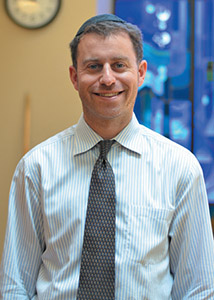


After a year of commuting between Denver and Englewood to the Moriah School, and laying the groundwork for his tenure, Rabbi Daniel Alter has taken the reins as Head of School. “I have been coming in regularly and working on strategic plans so I already feel integrated,” Rabbi Alter said in an interview with JLNJ, two weeks after moving to New Jersey. “I’m still just as excited as when I made my first visit.”
One of Rabbi Alter’s main priorities at Moriah is to infuse Hebrew language immersion into the curriculum. “Children in grades K—12 should speak Hebrew for many reasons,” Rabbi Alter said, “Much of what we try to achieve in Judaic studies requires knowledge of Hebrew language; the sifrei say that one is obligated to teach his children Hebrew. We have to be empowered to own our own texts—Chumash, Navi, Mishna—and you can only do that if you know the language. It also fosters a connection with Modern Israel.” While acknowledging there are differences between Biblical and spoken Hebrew, the gap is not wide. “There is a larger difference between Shakespeare and modern English,” he noted.
Early childhood is the school’s immediate focus. Rabbi Alter said language immersion requires a “zealous” approach and a high level of commitment. At the Denver Academy of Torah, where he recently served as Head of School, some of the teachers talked to the children only in Hebrew at recess and when they had Shabbat events together.
An advocate of looking at best practices and pedagogical literature to meet goals, Rabbi Alter sent Early Childhood Director Divsha Tollinsky, who is spearheading the program, to observe a school where half the day’s lessons are taught in Spanish and half in English. After finding that the students were having trouble with the transition, he is implementing a program of alternating days in English and Hebrew. The expectation is that by first grade the students will learn Yahadut b’ivrit—Jewish studies through Hebrew. The early childhood teachers have already had a preparatory workshop in instituting language immersion, taught by a professor brought in from Georgetown University.
A related goal is to revamp the tefillah program as part of a focus on Jewish life. Rabbi Alter wants to encourage students to be excited about their Judaism and feel responsible for their own growth. Rather than placing an emphasis on making the experience meaningful, Rabbi Alter wants to ensure that children gain necessary skills to have a life-long relationship with tefillah.
“Every student should be fluent in every aspect of tefillah,” Rabbi Alter emphasized. “The way tefillah is taught now, kids start with basic prayers and add more until they run out of time. There is a large percentage of kids who open a siddur and can’t read Tachanun. It’s difficult. In a typical minyan, most kids are not engaged. We plan to place students in programs to prepare them and when they are ready, they will move in. For a student who can’t read Hebrew in a minyan, it’s torture. Mastery breeds enjoyment.”
Moriah has always enjoyed a reputation for providing an excellent secular education, but Rabbi Alter would like to assess and document the school’s strengths and weaknesses. “We say we have the best of everything but how do we know? We don’t want to fool ourselves.”
When Rabbi Alter talks about what “we” will be doing, he means including faculty in the planning. “I want to create an environment where teachers play a significant role and feel a sense of excitement and dynamism. Moriah’s teachers have experience and talent; much to add. We’ll be having focus group meetings with them to talk about how to strengthen our programs, and what we should be thinking about. Teachers’ voices are important.”
Moriah has put in much time and effort into upgrading and introducing new technology into the classroom and more emphasis will be placed on using technology as a tool to personalize education. “In the old model of teaching, the bright students were bored and the weak students were struggling—so you taught to the middle,” Rabbi Alter said. “Education has to be student-centric, personalized, so that every student is challenged to grow and learn. Technology allows students to progress at their own pace; allowing students who grasp material quickly to advance and students who need help to get it. In this environment, it’s not as apparent when kids are struggling. They can learn without being placed in a special needs class. All students can feel confident.”
Research conducted by University of Pennsylvania psychologist Angela Lee Duckworth revealed that ‘grit’ is a common denominator of successful people. Rabbi Alter wants to find ways to help Moriah students develop grit, defined as courage and resolve, or perseverance and sustained interest in long term goals. “Non-academic characteristics contribute to academic success,” Rabbi Alter said. “Successful individuals have strong emotional intelligence. They are tenacious; they can pick themselves up.”
He would also like to make Moriah a place where everyone feels welcome. “Disneyland calls itself the happiest place on earth. I want to create a Moriah that is the friendliest place on earth. Everyone has to buy in—Administrators, teachers, parents. I’m working with the board now trying to find ways to bring in parent volunteers. Our parent body is successful in all types of fields and they are willing to engage and be involved in the school. We’re looking at how to take them up on that. We’re also looking for more chessed opportunities. One-time events like Mitzvah Day have their place but we want to create a culture of chessed that spreads itself out.”
Recognizing that school is only one influence on a child’s development, Rabbi Alter is looking to develop school-community partnerships. Moriah has hired the assistant rabbi from Englewood’s Ahavath Torah Sephardic Center to be a resource to the school’s significant percentage of Sephardic students, and discussions are underway with East Hill Synagogue to do some joint programming. Rabbi Alter said he’s looking at how to utilize teachers from Teaneck and Bergenfield to interact with the many students from those areas.
“Students don’t live in a vacuum; they are influenced by different mediums—school, shul, media, and family,” he said. “The more we can connect the dots, and bring them together, the more impactful we can be.”
By Betty Schwartz











